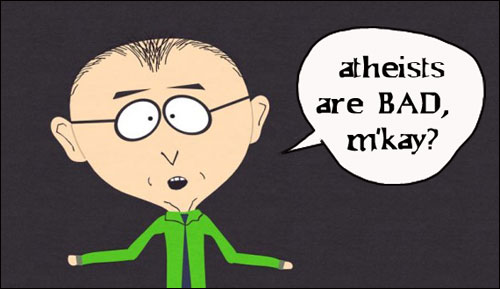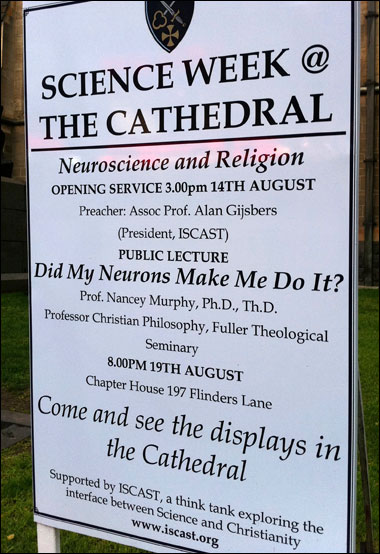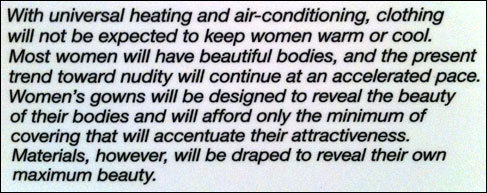Wed 31 Aug 2011
Misinforming Melbourne Part 2
Posted by anaglyph under Australiana, Religion, Scary, Science, Skeptical Thinking, Stupidity
[3] Comments

OK, well, as I hinted in the first part of my examination of Transforming Melbourne‘s hysterical Christian diatribe, I’ve saved the most misleading and offensive portion of it until last. As I’ve been writing, I’ve realised that it was getting rather longer than I like, so I’m going to break my analysis up into chunks, and intersperse them with other funnier stuff. See how much I love you all?
Shall we resume?
After making some valid points about the current role of religion in Australian society, ((Contrary to what Rob Isaachsen and his fellow Transformers think, rational people like myself can see that various Churches have done good things for Australian society. What we question is not the charitable acts, but the motivations behind them.)) Mr Isaachsen eventually says what is on his mind. And what an enlightening glimpse into the thinking of a religious person it is:
SOCIETY UNDER ATHEISM
Atheists have a very powerful voice in the media in Australia, frequently broadcasting biased opinions about the importance of rejecting all religion (especially Christianity) claiming it is of no value to society, is non-rational and a deception to the population. They have staged major conferences (including with government assistance) to promote atheism and denigrate religion and are calling on governments to end to the opportunity for any Christian content to be allowed in state schools and certainly to cease any funding for such!
Whoa. I’m almost tempted to laugh here, so hyperbolic does this document become in such a short few sentences. Atheists have a very powerful voice in the Australian media? Really? That comes as a big surprise to me, and I am pretty tuned in to such things. I think what is most upsetting for Mr Isaachsen and his Church is that atheists are actually voicing any opinion at all. He makes it sound like atheists are in control of the airwaves in Australia and that is very far from the truth. If there is anything surprising at all about atheist voices in the Australian media, it is that they have mostly been conspicuous by their absence until recent times. Atheist opinions are significantly challenging for the Church, which has for most of Australian history, had a kind of carte blanche – an unspoken imprimatur, even – to do be the sole arbiter of morality and ethics in Australian life. They really don’t like having that status quo questioned. And the pointed addition of ‘They have staged major conferences (including with government assistance)’ is spectacularly petty. Any assistance given to humanist, rationalist or atheist movements, as Mr Isaachsen must clearly be aware, is a piss in the ocean compared to the kind of government benefits accrued by religions in Australia. Is he trying to get Christians annoyed that some of their tax dollar is going to atheists? Well, sir, welcome to our grievance.
Mr Isaachsen accuses atheists of having biased opinions – a self-evident proposition if ever there was one. They’re hardly going to be unbiased when dealing with the enormous self-righteousness of Christians. He probably believes his bias is superior because he’s got God on his side…
In a vast and incorrect generalization he blankly states that atheists claim that religion ‘is of no value to society’. I doubt you’d find many atheists who would be that extreme and that declamatory. Religion quite evidently has brought value to society, but the question is how much currency that value now has, what that value actually is, and how important or relevant is the religious component of that value? This is a big problem for religion, and for Christians in particular, because their morality and their charity is so caught up in the edict of Jesus to evangelize that they simply can’t understand that good deeds can be, and are, done without an agenda imposed by a supernatural agency.
For example, earlier in the Transforming Melbourne tract, Mr Isaachsen has gone to great pains to point out all the wonderful things that Christian charities have achieved, and the heavy implication is that without them, non-religious people would commit no charitable acts of any kind, ever. He neglects to mention that huge compassionate non-profit organizations like Amnesty International, Médecins Sans Frontières, Malaria No More, Humanist Charities, the Red Cross and many, many others operate without having heeded ‘Jesus’ call to compassion and justice’. What’s more, these organizations can easily be argued to be more selfless than any of Mr Isaachsen’s examples of Christian charity, for the simple reason that they act out of human compassion and human compassion alone. They are not acting on a command to be good, or being goaded on by the Big Carrot of Heaven or the Big Stick of Hell.
Rob Isaachsen is trying to paint a picture that says an atheist can have no compassion, no care, no charity, no love, no human empathy. And yet it is a trivial task to show he is wrong. He might do well to reflect on the fact that one sincere act of atheist kindness makes nonsense of his whole religion.
[…to be continued…]











